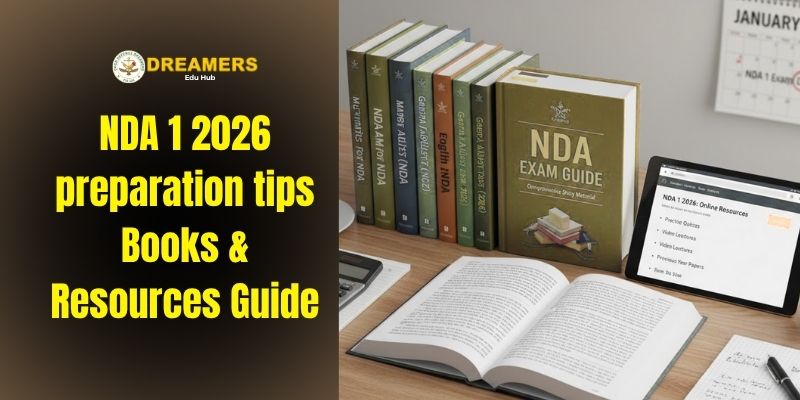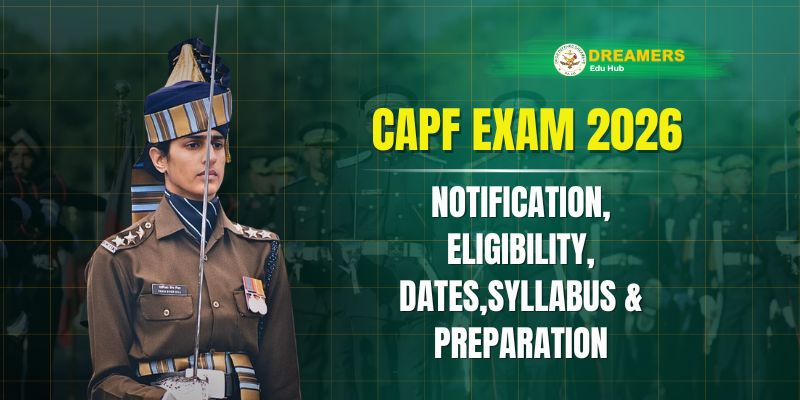If you’re serious about joining the Armed Forces through NDA this April, you need a plan that’s clear, practical, and realistic for a busy student. This guide explains the exam, the exact study material to use, how to revise in phases, and how to balance board exams with defence dreams plus actionable NDA 2026 preparation tips you can follow daily.
What the NDA exam actually checks
NDA tests your maths basics, your ability to read and reason, your general awareness, and your discipline to follow a plan. There are two papers on the same day: Mathematics and GAT with negative marking. You do not need “everything under the sun.” You need the right books, resources, and strategies used in the right order. That is where our focus phrase comes in: books resources & strategies for NDA 1 2026 that save time.
If you want a single line takeaway, remember this mantra: books resources & strategies for NDA 1 2026 repeated daily, and a short list of NDA 2026 preparation tips pinned above your desk. Before you start today’s session, read the line books resources & strategies for NDA 1 2026 once and then apply two quick NDA 2026 preparation tips: time your block and review mistakes.
The mindset you need
Think of your day as a series of short sprints: 90 minutes deep focus, 10 minutes break. Keep a small notebook of mistakes. Every time you revise, start from that notebook. This “mistake-first” approach is one of the most powerful NDA 2026 preparation tips because it turns errors into guaranteed marks next time.
80/20: Study the high-yield parts
Not all chapters give equal returns. Algebra, Trigonometry, Coordinate Geometry, and Calculus dominate Mathematics. In GAT, vocabulary, reading comprehension, Indian polity, history, geography, and basic science are high impact. The smart plan is to build a small core library: the exact books resources & strategies for NDA 1 2026 listed below, and a weekly routine that pushes the score needle.
Core booklist and why it works
You do not need a long list. You need a tight list you can finish. Here is a clean set used by toppers:
-
Mathematics: NCERTs for Classes 9–12 for basics; one problem book like RS Aggarwal Objective or Pathfinder for drill; a formula handbook you make yourself.
-
English: One vocabulary builder, a compact grammar book, and daily reading of editorials for context and tone.
-
GAT (GS): A concise General Knowledge compendium plus class notes for polity, history, geography, and science; one monthly current affairs digest to revise events.
-
Practice: Previous year question papers and two to three full-length mock tests every week after you finish basics.
This is the heart of books resources & strategies for NDA 1 2026 because it keeps your shelf light and your practice heavy.
Weekly plan that actually fits your life
Make a 6-day cycle and keep one day light. Use mornings for maths when your mind is fresh. Keep evenings for English and GS reading. On school-heavy days, do only revision and MCQs. These NDA 2026 preparation tips align with your real schedule instead of fighting it.
10 golden rules for faster progress
-
Solve basics first, speed later. 2) Write your own formula sheet. 3) Time every practice. 4) Review wrong answers the same day. 5) Keep a “doubt box.” 6) Revise with flashcards. 7) Do mini-tests of 30 questions. 8) Alternate maths and GAT to avoid fatigue. 9) Sleep 7 hours. 10) Protect the last two weeks for pure revision. These simple ideas are part of books resources & strategies for NDA 1 2026, but they also stand alone as strong NDA 2026 preparation tips.
Topic-wise priority table
Below is a quick view of the most tested areas and what to do with them.
| Section | Priority | What to master | Daily target | Typical mistakes |
|---|---|---|---|---|
| Mathematics | Very High | Algebra, Trigonometry, Calculus, Coordinate Geometry | 60–80 problems | Skipping steps, weak formula memory |
| English | High | Vocabulary, Grammar, Comprehension | 1 editorial + 30 vocab | Rushing passages, guessing idioms |
| GS (Polity/History/Geo) | High | Constitution basics, Modern history, Indian geography | 2 chapters | Learning facts without timelines |
| Science | Medium | Physics basics, Chemistry basics, Bio highlights | 1 chapter | Ignoring NCERT diagrams |
| Current Affairs | Medium | Last 6–8 months issues | 30 minutes | Only reading, no revising |
| Subject | Primary Books (Finishable Set) | Alternates / Add-ons | How to Use Daily | Notes |
|---|---|---|---|---|
| Mathematics | NCERT Class 9–12 (Maths) | RS Aggarwal Objective, Arihant Pathfinder (NDA/NA) | Morning: 60–80 problems + 10 min formula review | Build your formula handbook; do PYQs topic-wise |
| English – Grammar | Wren & Martin – High School English Grammar & Composition | SP Bakshi – Objective General English (Arihant) | 1 cloze test + 1 error-spotting set daily | Log mistakes in a mistake notebook |
| English – Vocab & RC | Word Power Made Easy (Norman Lewis) | Editorials: The Hindu / Indian Express | 1 editorial + 50-word summary + 10 new words | Turn new words into a mini-story |
| Polity (GS) | M. Laxmikanth – Indian Polity | Class/coaching notes | 2 topics/day + link with current affairs | Make article-wise short notes |
| Modern History (GS) | Spectrum – Brief History of Modern India | Selected NCERT 11–12 Themes | Timeline + map revision | Put dates/events on flashcards |
| Geography (GS) | G.C. Leong – Certificate Physical & Human Geography | NCERT Geo 9–12 (maps) | Draw India map weekly | Concept + location-based MCQs |
| Science (GS) | NCERT Science 9–10 (+ essential Class 11 Physics/Chem basics) | Class notes | 1 chapter/day + end exercises | Highlight diagrams & definitions |
| Current Affairs | One monthly CA digest (last 6–8 months) | Weekly revision notes | 30 min/day + weekly recap | In last 15 days, do 2-pass revision |
| PYQs | UPSC NDA Previous Years (topic-wise) | — | Alongside study topic-wise, later as mixed sets | Learn patterns, traps, skip strategy |
| Mock Tests | Full-length NDA Mocks (2/week) | OMR practice sheets | Fixed days: Sat/Wed + same-day analysis | Re-solve mistakes; note speed blocks |
How to read NCERTs fast and well
Read the chapter once to get the story. Read again with a pencil and mark definitions, lists, and laws. Make a one-page summary per chapter. Solve all in-text examples and back exercises. This respectful speed reading is one of the best NDA 2026 preparation tips because it protects time while building concept depth that mock tests alone cannot create.
Building your formula and mistake books
Your formula book should be handmade, arranged by topic, and updated after every test. Color-code: green for must-know, yellow for tricky, red for often-wrong. Your mistake book should have the question, the exact wrong step, and the correct method in one line. Reviewing both books every third day is a core part of books resources & strategies for NDA 1 2026 and converts revision into marks.
English and communication without confusion
For English, do this simple routine: 1 editorial a day; write a 50-word summary; pick 10 new words and make a mini story using them; practice one cloze test and one error spotting set. Recording yourself for two minutes daily is among the most practical NDA 2026 preparation tips that transfer from written exam to personality tests.
GS that sticks
Instead of rote, build timelines and maps. For polity, connect articles to real news examples. For geography, draw India’s map from memory weekly. A compact resource set, revised many times, beats a huge library—this is the spirit of books resources & strategies for NDA 1 2026 in GS.
PYQs and mocks: the score multipliers
Do not save PYQs for the end. Solve them topic-wise while you study, then again as mixed sets. For mocks, simulate the real timing and OMR bubbling. Identify speed traps and tweak your plan weekly. Again, this is where books resources & strategies for NDA 1 2026 meet reality and produce improvement.
How to revise in three phases
-
Phase 1 (Concept sweep): Revisit basics from NCERTs and notes. Make flashcards for formulas and definitions.
-
Phase 2 (Drill and speed): Daily mixed problem sets and timed RCs; re-do old wrong questions.
-
Phase 3 (Exam polish): Full mocks on fixed days; revision of formula and mistake books; light reading a night before tests.
These staged cycles are proven NDA 2026 preparation tips because they remove last-minute panic.
Time management in the exam hall
For Mathematics, scan the paper and mark must-do questions first. Avoid ego traps like a long calculus problem when an easy trigonometry question is available. For GAT, fix micro-blocks and use a two-pass method. This belongs inside books resources & strategies for NDA 1 2026 because it raises attempts without raising risk.
Last 15 days plan
Cut new learning to almost zero. Spend 70% time on revision of formula and mistake books, 20% on light mocks, and 10% on rest. Prioritise health: hydration, food, and sleep. A calm 15-day finish is one of the most valuable NDA 2026 preparation tips because it protects your brain for the big day.
A one-page blueprint you can follow today
Your daily blueprint is simple: pick the core books resources & strategies for NDA 1 2026, set a 6-day timetable, read NCERTs with one-page notes, maintain formula and mistake books, solve PYQs topic-wise, take two mocks a week with full analysis, and keep the last 15 days for polish. Keep returning to books resources & strategies for NDA 1 2026 as your north star. Bookmark these NDA 2026 preparation tips for quick reminders.
SEO note for clarity: Use books resources & strategies for NDA 1 2026 as your anchor checklist and keep a short set of NDA 2026 preparation tips visible on your desk.
Final word
Success in NDA comes from a short, sharp list of material, repeated with focus. The right books resources & strategies for NDA 1 2026 are not fancy; they are finishable. Make your shelf light, your practice heavy, and your revision tight.
Repeat the mantra: books resources & strategies for NDA 1 2026 in your study plan, and lean on crisp NDA 2026 preparation tips whenever you feel stuck.


































